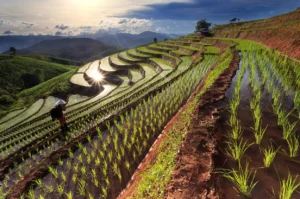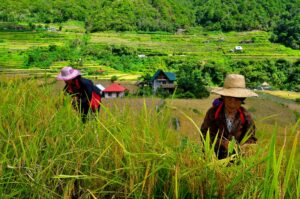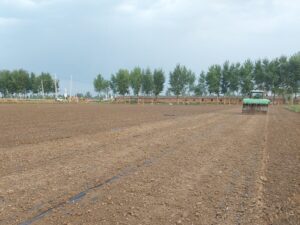
In view of the severe lack of capacity in rice production,which is throttling the development of Africa’s rice sector, participants at the Africa Rice Congress 2010 held in Bamako, Mali, in March 2010 called for a “Marshal Plan” (Africa’s “Marshall Plan” was largely inspired by the Europe Recovery Program, which was used to re-build Europe after the devastation caused by World War II)  to overcome this weakness.

The Congress brought together nearly 450 participants from 54 countries, particularly from Africa. The participants included rice farmers; seed producers; processors; input dealers; manufacturers of agricultural machinery; national rice research and extension systems; representatives from agricultural ministries, international and advanced research institutes, non-government organizations, and the donor community; and other development partners.
The participants took this opportunity to deliberate on strategies to significantly increase rice production in Africa, develop competitive and equitable rice value chains, reduce imports, and enhance regional trade. They enthusiastically supported the newly proposed Global Rice Science Partnership, an initiative of the Africa Rice Center (AfricaRice), the International Rice Research Institute (IRRI), and the International Center for Tropical Agriculture (CIAT) to harmonize national and international rice research agendas worldwide for increased impact in Africa.
Interestingly, the Congress highlighted that rice has become a strategic commodity that can potentially fuel economic growth and reduce hunger and poverty across the continent. Rice consumption in Africa is growing at 6–7% per year. To meet this demand, Africa imports close to 10 million tons each year, which is equivalent to one third of the rice traded in the world market, and this costs US$4 billion in foreign exchange.
“Our studies show that the continent has sufficient land and water resources and favorable growth environments to close the gap between Africa’s rice consumption and production, and that local rice production can be competitive vis-à -vis imported rice,” said Papa Abdoulaye Seck, AfricaRice director general.
 He underlined that the capacity of national programs has to be strengthened with support from regional and international organizations. “There has to be increased technological innovations supported by an appropriate policy environment,” he added.
He underlined that the capacity of national programs has to be strengthened with support from regional and international organizations. “There has to be increased technological innovations supported by an appropriate policy environment,” he added.
The Africa Rice Congress 2010, with a theme “Innovation and partnerships to realize Africa’s rice potential,” was organized by AfricaRice in collaboration with the national program—the Institut d’économie rurale (IER)— under the aegis of the Malian government.
Under the main theme, the topics included rice genetic diversity and improvement; ecological intensification and diversification of rice-based systems; developing competitive rice value chains; new alliances and tools for rural learning and innovations and policy implications; integrated management of pests, diseases, and weeds in ricebased systems; and rice physiology and modeling. (Read more about indigenous African rice in Pockets of gold.)
A major part of the Congress was a forum on “Investing in Africa’s rice sector: opportunities and challenges,” in which ways to increase investments in the rice sector in Africa particularly through innovative public-private partnerships were explored. Issues such as the need to increase investments for increasing the area under irrigation, improving rural infrastructure, and introducing agricultural mechanization were raised. The forum featured exhibitions of machinery, inputs, and rice products.
During the opening ceremony, on behalf of Mali’s President Amadou Toumani Touré, Prime Minister Modibo Sidibé presented distinguished service awards to Drs. Jacques Diouf, Eugene Terry, and Kanayo Nwanze for their outstanding contributions to rice research and development in Africa during their respective terms as director general of AfricaRice.
Dr. Getachew Engida, AfricaRice Board chair, presented a plaque of appreciation to President Touré for his government’s tremendous efforts to raise rice productivity through the Presidential Initiative on Rice in Mali, which has led to a 50% increase in rice production in the country. Awards for the best presentation per theme, the best poster, and the Most Promising Young Scientist were also presented.
At the end of the Congress, the following key recommendations were made to boost Africa’s rice sector:
Investments in Africa’s rice sector
- Africa’s rice farmers need to be involved in the definition and implementation of policies that modernize rice farming, lessen the burden on women, and turn it into a viable agribusiness, attractive to young people.
- National and foreign investments are needed to unlock Africa’s tremendous rice potential, while ensuring that this leads to win-win situations for all of Africa’s rice farmers and consumers.
- Sustainable intensification and diversification of rice-based production systems are necessary to meet the demand of Africa’s population.
- National seed regulatory bodies need to be established and/or strengthened to map and meet rice seed demand for target ecosystems and consumer preferences. They should ensure efficient varietal release mechanisms, link public- and private-sector seed producers, and establish functional and decentralized seed control systems.
- Small-scale enterprises will need support to help them create and sustain a viable seed business. Private medium- and large-size seed companies should play an increasingly important role in high input systems, especially for hybrid rice seed.
- Regional economic communities should be strengthened to contribute to harmonizing seed legislation, and import tariffs, and regulating rice imports, in line with the Comprehensive Africa Agriculture Development Programme framework.
- National governments should lead in promoting public-private partnerships across the rice value chain for adequate production, storage, processing, and distribution infrastructure to produce quality rice for the African market.
- A global effort to develop targeted technological options to help African farmers to adapt and mitigate the effects of climate change is needed.
Investments in capacity building

- A “Marshal Plan” by African governments and their development partners is needed to substantially strengthen the training and retention of new staff, while updating agricultural curricula in vocational training schools and universities and ensuring efficient spillover to actors in the rice value chain. Conducive working environments are required to retain an effective level of capacity in agriculture.
- The Congress initiated the task force concept, a collective research-for-development effort on critical thematic areas in the rice sector, based on the principles of sustainability, buildup of critical mass, and ownership by national systems. AfricaRice was specifically asked to facilitate and animate these task forces.
- The Congress endorsed the emergence of a Global Rice Science Partnership, an initiative of AfricaRice, IRRI, and CIAT, as part of the revamped Consultative Group on International Agricultural Research, to pool resources, build capacity, and align national and international research agendas, thus enabling greater efficiency and efficacy in rice research.
____________________________________________
Ms. Mohapatra serves as Head of Marketing & Communications and Member of the Office of the Director General at Africa Rice Center.









